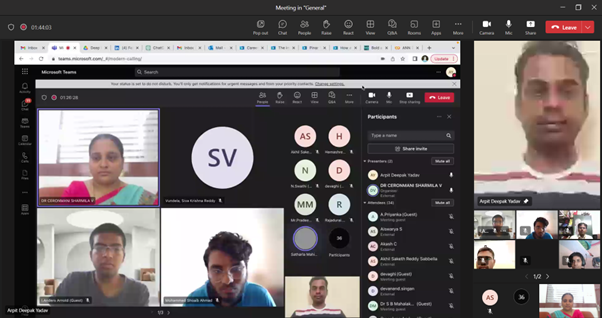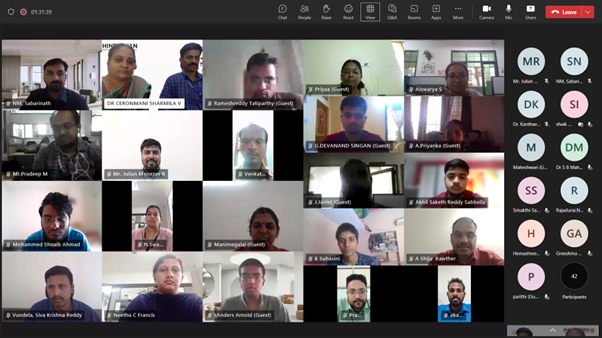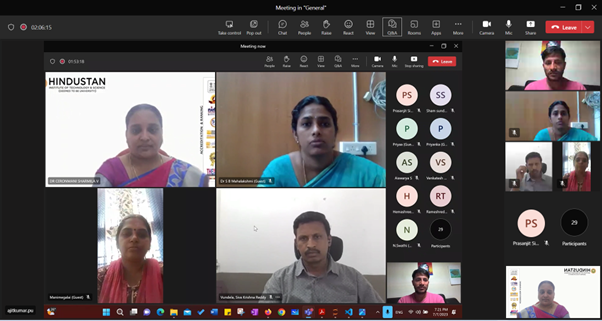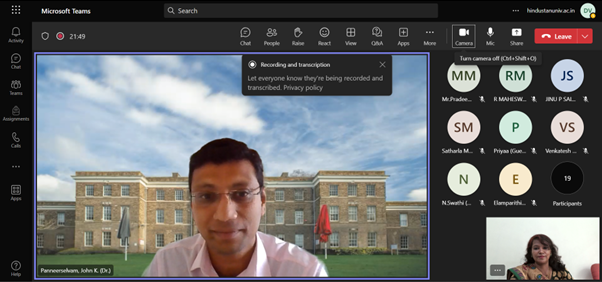-
- Back
-
- Back
-
- Back
-
- Back
-
- Back
-
- Back
-
- Back
-
- Back
Summer Workshop on Developing Cybersecurity Models Using Deep Learning Techniques
Summer Workshop on Developing Cybersecurity Models Using Deep Learning Techniques

Summer Workshop on Developing Cybersecurity Models Using Deep Learning Techniques
A five-day summer Workshop on Developing Cyber Security Models using Deep Learning Techniques was organized by the Center for Networking and Cyber Defense (CNCD) in collaboration with the Department of Information Technology, HITS. The event was sponsored by Institution of Engineering and technology (IET) and was conducted through the MS Teams platform between 4 - 8 July 2023. The workshop commenced with a grand inaugural ceremony.
The welcome address and introduction about program was presented by Dr. V. Ceronmani Sharmila, HOD-IT, HITS. During the address the trends of Cyber security and Deep learning was highlighted. The presidential address was delivered by Dr. Kanthavel, Dean-CSE and Digital Initiatives, HITS. He highlighted the impact of Cyber security programme. The felicitation address was given by Dr. T. Sudalaimuthu, Professor and CISO, HITS. Ms. Maheswari, an Assistant Professor of IT at HITS, delivered the introduction for the chief guest.
The keynote address was delivered by the chief guest of the event Mr. Sabarinath, Associate Partner – Digital Trust, KPMG, Pvt. Ltd., Chennai. He highlighted the paramount significance of seaside security, boundaries, work from home security and the need for developing Cyber Models for the above requirements. He also spoke on the importance of user security, and how future of attacks is moving from Corporate Environment to Eco System of corporates. The inaugural ceremony was concluded with vote of thanks proposed by Mr. Julian Menezes, Assistant Professor, IT, HITS.
Day 1:
Session 1: Deep Learning for Cyber Security
Speaker: Mr. Arpit Yadev, Senior Data Scientist, AIML Consultant, upGrad-INSOFE, Bangalore
In this session, Mr. Arpit Yadev provided an introduction to deep learning and its applications in the field of cyber security. He discussed the fundamental concepts of neural networks and their architecture, including feedforward and convolutional neural networks. The speaker emphasized the role of deep learning in various cyber security tasks such as intrusion detection, malware analysis, and anomaly detection. Participants gained insights into how deep learning techniques can enhance the security of systems and networks.
Day 2:
Session 2: Semi-supervised learning models for Cyber Security
Speaker: Dr. Y. C. A. Padmanabha Reddy, Associate Professor, Department of Computer Science and Engineering, B V Raju Institute of Technology, Narsapur, Medak, Telangana
Dr. Reddy focused on semi-supervised learning approaches specifically tailored for cyber security applications. He explained how semi-supervised learning algorithms can leverage both labeled and unlabeled data to improve the accuracy of models. Participants learned about techniques such as self-training, co-training, and multi-view learning in the context of cyber security. The session included practical examples and case studies to demonstrate the effectiveness of semi-supervised learning in detecting and mitigating cyber threats.
Day 3:
Session 3: Generative AI: Image to Image Generation
Speaker: Mr. Arpit Yadev, Senior Data Scientist, AIML Consultant, upGrad-INSOFE, Bangalore
Mr. Arpit Yadev delved into the field of generative AI, with a focus on image-to-image generation techniques. He explained how deep learning models such as generative adversarial networks (GANs) and variational autoencoders (VAEs) can be used to generate realistic images. The session covered various applications of generative AI in cyber security, including data augmentation, synthetic dataset generation, and adversarial example detection. Participants gained insights into the capabilities and limitations of generative AI for enhancing cyber security defenses.
Day 4:
Session 4: Responsible Learning for IoT Security
Speaker: Dr. John Panneerselvam, Senior Lecturer, University of Leicester, UK
Dr. Panneerselvam discussed the challenges and vulnerabilities associated with the Internet of Things (IoT) and the importance of responsible learning in IoT security. The session covered topics such as secure IoT device authentication, anomaly detection in IoT networks, and privacy preservation in IoT data. Dr. Panneerselvam highlighted the ethical considerations involved in deploying IoT devices and emphasized the need for responsible practices to ensure the security and privacy of IoT ecosystems.
Day 5:
Session 5: Deep Neural Network Models for Mobile Malware Detection
Speaker: Dr. Padmavathi Ganapathi, Dean, Avinashilingam Institute for Home Science and Higher Education for Women, Coimbatore
Dr. Ganapathi focused on the use of deep neural network models for detecting and mitigating mobile malware. She explained the unique challenges posed by mobile malware and discussed various deep learning architectures, such as recurrent neural networks (RNNs) and long short-term memory (LSTM) networks, for effective detection. The session included practical demonstrations and case studies to illustrate the application of deep learning in mobile malware detection.
Session 6: Cyber Security Models using Data Science Tool Kit
Speaker: Mr. Praveen Singh, Senior Data Scientist, HSBC, Bangalore
Mr. Praveen Singh introduced participants to the data science tools and techniques used in developing cyber security models. He discussed the data preprocessing steps, feature engineering, and model selection process specific to cyber security applications. Participants learned about popular data science libraries and frameworks for implementing deep learning models in the context of cyber security. Practical examples and hands-on exercises were provided to enhance the participants' understanding of the data science tool kit.
Session 7: Cyber Threat Intelligence
Speaker: Mr. Srinivasa Raju Vuppalapati, Chief Technology Officer, Ecorfy, Hyderabad
Mr. Srinivasa Raju Vuppalapati provided insights into cyber threat intelligence and its significance in proactive cyber defense. He discussed various sources of threat intelligence, including open-source intelligence (OSINT), dark web monitoring, and security information and event management (SIEM) systems. The session covered the application of deep learning techniques in threat intelligence, including threat detection, classification, and predictive analytics. Participants gained a deeper understanding of how cyber threat intelligence can inform proactive security measures.
Session 8: Building Malware Detector using Machine Learning
Speaker: Dr. Ajit Kumar, Post Doctoral Fellow, Soongsil University, Seoul, South Korea
Dr. Ajit Kumar presented an overview of machine learning techniques used for building effective malware detectors. He discussed feature extraction, dimensionality reduction, and classification algorithms specifically tailored for malware detection. The session covered the application of deep learning models, such as convolutional neural networks (CNNs) and recurrent neural networks (RNNs), in detecting and classifying malware samples. Practical examples and case studies were shared to illustrate the implementation of machine learning in building malware detectors.
Session 9: Demystifying Cyber Attacks: Unveiling Hackers' Strategies, Methods, and Processes - Reinventing Prevention with Deep Learning
Speaker: Mr. Akash Venkatesan, Cybersecurity Advisor, Founder & CEO of Tutelr Group, Chennai.
Mr. Akash Venkatesan provided insights into the strategies, methods, and processes employed by hackers in cyber-attacks. He discussed various attack vectors, including phishing, social engineering, and malware propagation. The session focused on leveraging deep learning techniques to develop proactive defense mechanisms against evolving cyber threats. Participants gained a deeper understanding of the attacker's mindset and learned how to employ deep learning for reinforcing preventive measures.
Session 10: Demystifying Cyber Attacks: Unveiling Hackers' Strategies, Methods, and Processes - Reinventing Prevention with Deep Learning
Speaker: Dr. V. Ceronmani Sharmila, Professor & Head, Department of Information Technology, HITS
Dr. V. Ceronmani Sharmila explored the wide-ranging applications of deep learning in the field of cyber security. The session covered topics such as network intrusion detection, user behavior analysis, and vulnerability assessment using deep learning techniques. Dr. Sharmila discussed the challenges and opportunities associated with implementing deep learning models in real-world cyber security scenarios. The session concluded with a discussion on future research directions and emerging trends in the intersection of deep learning and cyber security.
Overall, the workshop provided participants with comprehensive insights into developing cyber security models using deep learning techniques. The sessions covered a broad spectrum of topics, ranging from the fundamentals of deep learning to its applications in various cyber security domains. Participants gained practical knowledge and understanding through case studies, demonstrations, and hands-on exercises, equipping them with valuable skills to address the evolving challenges of cyber security.





